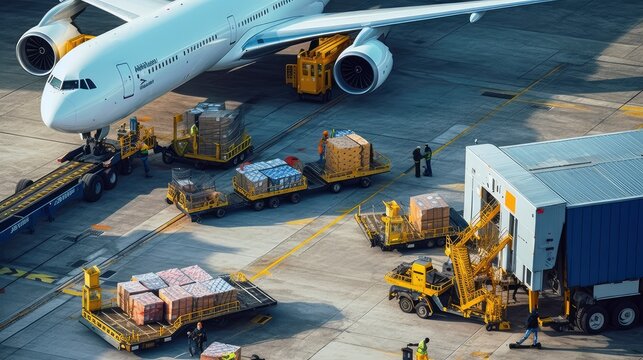- By TOP CHINA FREIGHT
- September 26, 2025
- Air Freight, Shipping
Table of Contents
Air freight charges from China to Pakistan are a critical factor for businesses managing cross-border supply chains. With growing trade between both countries, importers need clear insight into costs, transit times, and customs requirements. This guide explains the pricing structure, cost-saving strategies, and essential tips for managing your shipments efficiently.

What factors determine air freight charges from China to Pakistan?
Air freight charges depend on multiple variables rather than a flat rate. Carriers calculate costs based on either the actual weight or the volumetric weight of the cargo, whichever is greater. Additionally, surcharges like fuel costs, security fees, and terminal handling charges affect the final bill.
Other important factors include:
- Cargo type: Hazardous goods, perishables, or high-value electronics may attract higher charges.
- Origin airport: Shipping from Shanghai or Guangzhou may cost differently than from Shenzhen.
- Destination airport: Karachi, Lahore, and Islamabad have varying handling fees and transit capacity.
- Seasonal demand: Peak periods such as Ramadan or holiday seasons push up freight rates.
How much does air freight from China to Pakistan cost on average?

The cost of air freight varies depending on shipment weight, dimensions, and service type. Below is a general reference table of average costs:
| Shipment Weight | Estimated Cost per Kg | Transit Time | Notes |
|---|---|---|---|
| 45–100 kg | $4.50 – $6.00 | 3–5 days | Suitable for urgent goods |
| 101–300 kg | $3.80 – $5.20 | 3–6 days | Balanced cost & speed |
| 301–500 kg | $3.20 – $4.80 | 4–7 days | Best for bulk shipments |
| 500+ kg | Negotiable | 5–8 days | Volume discounts apply |
Note: Rates fluctuate due to fuel surcharges, currency exchange, and airline availability.
Why choose air freight over sea or rail transport?
While sea freight remains the cheapest option for large consignments, air freight ensures faster and safer delivery. Rail transport is not a direct option for China–Pakistan trade, so businesses usually choose between air and sea.
| Mode | Transit Time | Cost | Pros | Cons |
|---|---|---|---|---|
| Air Freight | 3–7 days | High | Fast, reliable, ideal for urgent goods | Expensive for bulky cargo |
| Sea Freight | 20–30 days | Low | Economical, handles large volumes | Slow, risk of port congestion |
Therefore, businesses that deal in electronics, textiles, pharmaceuticals, or perishable goods often prefer air freight for efficiency despite higher costs.
What is the transit time for air freight to Pakistan?
Transit times vary depending on the airport pair and carrier schedule. Direct flights are faster, while transshipments through hubs like Dubai, Doha, or Hong Kong add extra time.
| Origin in China | Destination in Pakistan | Average Transit Time |
|---|---|---|
| Guangzhou | Karachi | 3–4 days |
| Shenzhen | Lahore | 4–6 days |
| Shanghai | Islamabad | 5–7 days |
| Beijing | Karachi | 5–8 days |
Careful planning ensures timely delivery, especially for businesses with seasonal inventory cycles.
Which documents are required for air freight shipments?

Proper documentation is vital to avoid customs delays. Importers must prepare the following:
| Document | Purpose |
|---|---|
| Air Waybill (AWB) | Proof of shipment and tracking |
| Commercial Invoice | Declares cargo value for customs |
| Packing List | Details dimensions and weight |
| Certificate of Origin | Verifies country of manufacture |
| Import License (if required) | Ensures compliance with Pakistani regulations |
Errors in paperwork can lead to penalties, so working with an experienced freight forwarder is highly recommended.
How can businesses reduce air freight costs?
Reduce volumetric weight by using compact, durable packaging.
Avoid peak seasons when airlines charge premium rates.
Real-time monitoring of cargo status
Long-term agreements with carriers can secure stable pricing.
Ship through airports with higher cargo volumes, such as Guangzhou or Shanghai.
Case study: Textile importer shipping from Guangzhou to Karachi

A mid-sized textile company in Lahore needed to import high-value fashion garments urgently before Eid. Sea freight was too slow, so the company opted for air freight from Guangzhou to Karachi.
- Shipment weight: 420 kg
- Service type: Standard air freight
- Transit time: 5 days (including customs clearance)
- Total cost: Around $1,750 (≈$4.20 per kg)
Although the company paid higher charges compared to sea freight, the goods arrived in time for peak demand. The profit margin from timely sales offset the freight cost significantly, proving the value of air transport for time-sensitive industries.
What are the pros and cons of air freight to Pakistan?
| Pros | Cons |
|---|---|
| Fastest transit time | High cost per kg |
| Reduced risk of damage | Limited cargo capacity |
| Ideal for perishable goods | Heavier customs scrutiny |
| Reliable delivery schedules | Price fluctuations due to fuel costs |
Should you use express courier or standard air freight?
When choosing between express couriers (DHL, FedEx, UPS) and standard air freight, the decision depends on shipment size and urgency.
Express courier:
Best for small packages under 50 kg. Transit is usually 2–4 days. However, rates per kilogram are higher.
Standard air freight:
Cost-efficient for bulk shipments above 100 kg. Transit is slightly longer but cheaper per unit.
Businesses importing samples or urgent documents usually prefer express courier, while large importers rely on standard freight forwarders.
How do customs duties affect total freight costs?
Besides freight charges, importers must account for customs duties and taxes in Pakistan. Duty rates vary depending on product categories such as electronics, chemicals, or apparel. Additionally, importers must pay sales tax and withholding tax at customs clearance.
Planning ahead with accurate HS codes ensures transparency in total landed cost, helping businesses avoid unexpected expenses.
What industries benefit most from air freight to Pakistan?
| Industry | Typical Cargo | Why Choose Air Freight? |
|---|---|---|
| Textiles | Garments, fabrics | Fast delivery for seasonal demand |
| Pharma | Medicines, vaccines | Controlled environment, minimal delay |
| Electronics | Mobile phones, laptops | Secure, theft-reduced transport |
| Agriculture | Fresh produce | Maintains freshness, faster shelf entry |
Therefore, companies in these sectors often budget for higher freight charges to ensure market competitiveness.
Conclusion
Air freight charges from China to Pakistan vary depending on cargo weight, volume, service type, and seasonal demand. While costs are higher compared to sea freight, the speed, reliability, and reduced risk of damage make it an attractive choice for businesses dealing in urgent or high-value goods. By consolidating shipments, optimizing packaging, and partnering with a reliable freight forwarder, companies can reduce costs and ensure timely deliveries.
Need a Shipping Quote?
If you want expert guidance and peace of mind, our team is ready to assist.
TJ China Freight offers tailored solutions to help businesses of all sizes ship more reliably from China.

FAQ
Q1:Can I track my air freight shipment in real time?
Yes, you can track shipments using the Air Waybill number. Most airlines and freight forwarders provide online tracking systems for real-time status updates.
Q2:Do air freight charges include customs duties in Pakistan?
No. Air freight charges cover transport only. Customs duties, taxes, and clearance fees are additional costs handled at destination.
Q3:What is the maximum weight limit for air freight from China?
It depends on the aircraft. Cargo planes can handle several tons, while passenger flights have lower limits. Check with your forwarder for details.
Q4:Are there restrictions on goods shipped by air?
Yes. Items like flammable liquids, lithium batteries, and chemicals may need special permits and packaging. Always confirm before shipping.
Q5:How early should I book air freight during peak season?
Book at least 2–3 weeks in advance during Ramadan, Eid, or year-end to secure space and avoid rate increases.
